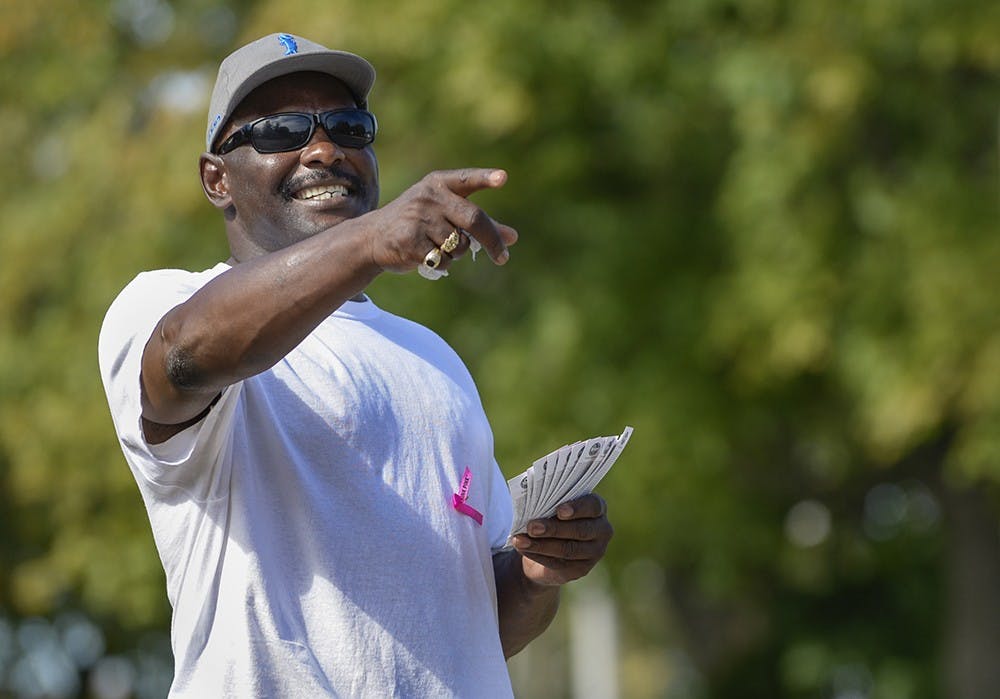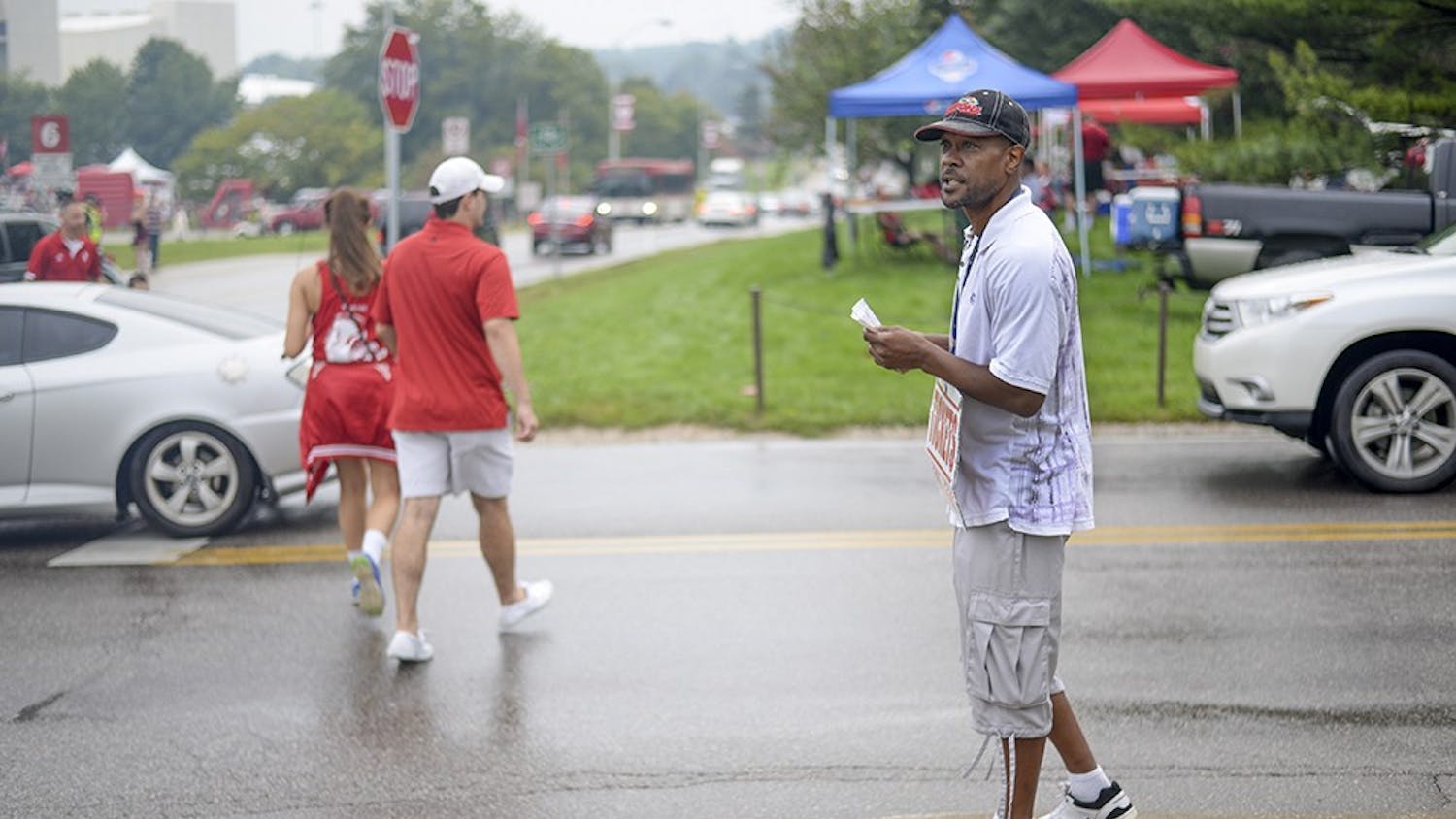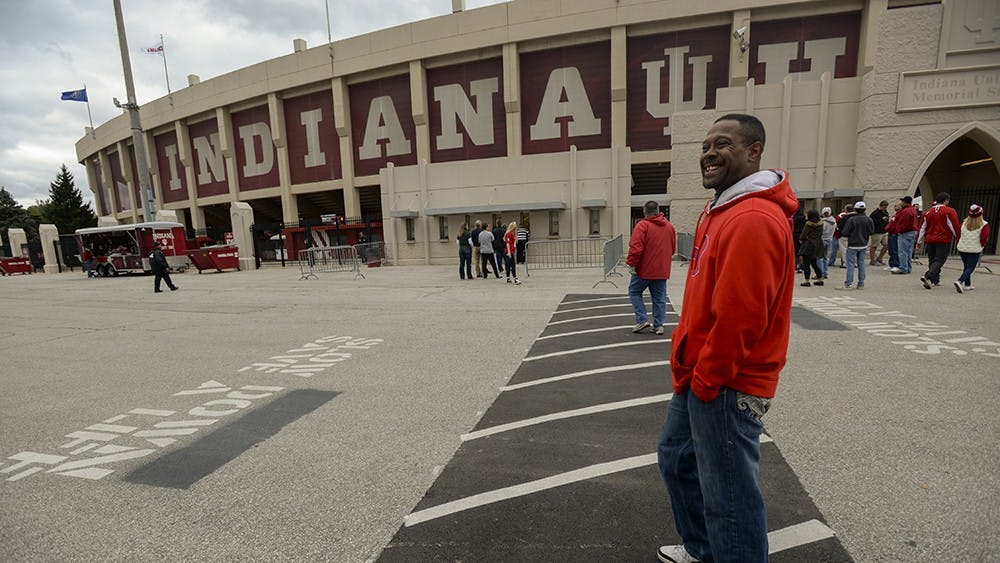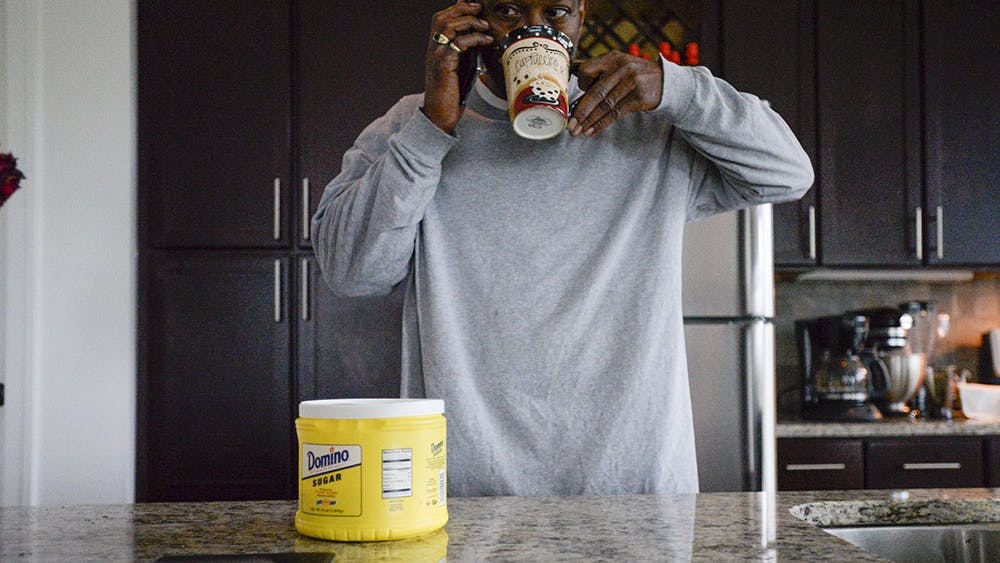Scalping tickets at IU football games has never been easy. Demand is always low to see a team that has been so bad for so long it has become a punch line. But now, scalping outside of Memorial Stadium is harder than ever.
In recent years, online ticket sites such as StubHub have sliced into the profits of the guy on the street corner.
Ever since StubHub became a household name, street scalpers have found it more difficult to scrounge out a living, especially during IU’s football season. They’re not allowed on University grounds. Most scalpers hang out on the south side of 17th Street, just across from the stadium’s parking lots, where Indiana Avenue comes to a T.
The area is alive with activity before opening kickoff. The smell of barbecue chicken fills the air. From the tailgate fields, Lil Jon pounds from the speakers, singing “Shots, shots, shots, shots, shots, shots.” Across the street at the stadium, the Marching 100 plays the IU fight song.
The scalpers prowl the sidewalks, trying to drown out their competition with calls of “Tickets? Tickets? Anybody need tickets?” They wander in and out of traffic, leaning into open car windows. They eye the scantily dressed co-eds on their way to tailgate parties. When they spy an interested customer, the scalpers pounce, sometimes several at once. They elbow their competitors, fighting for the chance to negotiate.
Jeffrey’s favorite spot is the southwest corner of Indiana and 17th. He patrols his turf with a confidence gained after 18 years of scalping sporting events and concerts around the country. He moves with the swiftness of a younger man. His booming voice rises above the competition with a precisely honed cadence.
“You guys need tickets? No? OK, you fellas have a nice day.”
His name is actually Brian Stapleton. He adopted the name Jeffrey years ago. His mentor knew him as Jeffrey, so everyone knew him as Jeffrey. It stuck.
“Tickets? Who needs tickets?”
The scalpers show no hesitation. This is their trading floor. One of the perennial figures calls himself Dirty. He insists he’s 53 but looks much younger. He usually wears sunglasses, even on rainy days like today. Dirty never gives up his real name.
“Want to know my real name?” he cackles. “Dirty as they come.”
Dirty is constantly moving, usually riding around on his bike. His pitch is one of the loudest.
“You got any tickets?” Dirty says to a woman wearing tight jeans.
“No,” she says. As she walks away, he checks her out.
“You got a man?” he says, only partly under his breath.
A little later, a female student wearing overalls, and not much else, makes her way toward the tailgate fields. As she passes Dirty, his stare hangs.
“Oh,” Dirty says. “I’ll give you a ticket for free.”
One of Dirty’s competitors is an old white man sitting nearby in a metal folding chair.
His name is Paul Shockley, but others on the corner call him the King. The King has been working outside IU games for more than 40 years. But don’t call him a scalper.
“It’s like calling a police officer a pig,” he snarls. “I’m a buyer and seller of tickets.”
Why do people call him the King?
“I don’t cheat people.”
His voice is soft and doesn’t travel well, even when his temper acts up — which is often. His white beard and a ball cap hide his eyes. He’s heavy. Unlike Jeffrey and Dirty and his competitors, he doesn’t move quickly and can’t stand for long periods. Confined to his throne, the King waits for people to come to him.
Back when Bob Knight was the coach of the IU men’s basketball team, the King says he made $5,000 a game. His yearly profits eclipsed at $100,000 a year.
But if it weren’t for his regular customers, he wouldn’t make anything now, he says. That’s why he vows this is the last year he’ll work the corner.
“There’s no money in it anymore.”
The King doesn’t hide his disgust for the other scalpers. He thinks they have no respect. He says they don’t appreciate the finer points of negotiation.
“These sons of bitches,” he says, “will sell their grandmother for a nickel.”
His inability to move around is a disadvantage. But he looks like Santa Claus, and when the fans notice his grandfatherly features, they relax.
The rivalries are intense between the scalpers. They’re not only selling but also buying. It all depends on the market.
On the day of the season opener, Jeffrey engages a potential customer in negotiation, and Dirty comes up to the two men and starts yelling, “Hey, hey, hey,” trying to steal Jeffrey’s deal.
“Come on, Dirty,” Jeffrey says, but he never breaks eye contact with his
customer.
“What you got?” Dirty asks the man with the tickets, ignoring Jeffrey’s plea.
Jeffrey starts talking louder. So does Dirty.
Jeffrey turns his right shoulder slightly, trying to box Dirty out.
The customer doesn’t engage Dirty in his attempts to steal Jeffrey’s deal. Dirty walks away.
The man wants $100 for four tickets, $25 each. He ends up taking $30 total. That’s how scalpers make their money — buying low. Most of the time Jeffrey goes to a game with nothing in his pocket except cash.
“Not even $10 each for them,” said the man who sold the tickets. “I was just trying to unload them, though.”
Later, Jeffrey gets a chance to turn a profit.
He leans inside the passenger window of a dark blue Hyundai Tucson, holding up traffic. He wants $100 for four tickets.
A cop standing across the street yells, “Hey, move it.”
The Tucson creeps forward, and Jeffrey jogs to keep up. He takes their money and gives them back their change.
The Tucson turns right on 17th Street.
“Thank you!”
Jeffrey stuffs the cash into his cargo shorts.
Seventy-dollar profit.






